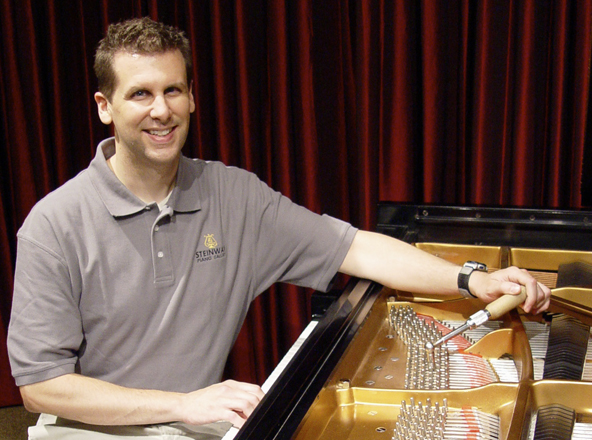
Get better performance and a longer life out of your pianos with some simple maintenance…
Tuning
How often? Twice each year
Why? Even if your piano is not played often, it experiences seasonal changes. Regular tunings by a qualified technician will make your piano more fun to play, extend its life, and protect your investment.
Pitch Raise
How often? Varies. A piano technician can only tell if a piano needs a pitch raise when they begin tuning the piano. However, it’s safe to assume any piano that has not been tuned in six months or more needs a pitch raise.
What does it do? Think of pitch raising as a series of “gradual” tunings.
Why should I do it? If a piano hasn’t been tuned in a long time – as in the case of most pianos that are sold by private parties – a pitch raise will keep an out-of-tune piano in tune much longer.
Note: Pitch raising a piano with loose tuning pins will not keep it in tune longer. Loose pins indicate a catastrophic failure of the pinblock which basically means the piano is no longer able to be used as a reliable instrument.
Regulation
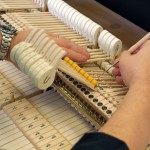
How often? Every ten years or so.
What does it do? Regulation is the process of adjusting small screws and springs on the action parts to change or even the feel and performance of the piano.
Why should I do it? As pianos are played, action parts wear unevenly. The notes in the middle of the keyboard are played more that the notes at either end. Proper regulation by a qualified technician dramatically improves the response of the keys, making you sound even better than you did before.
Voicing
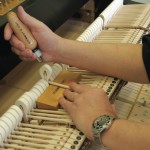
How often? Every ten years or so.
What does it do? Voicing is the process of adjusting hammer felt to brighten, soften or even the sound.
Why should I do it? As a piano’s hammers wear, it’s voice changes. A qualified technician can restore the shape and density of the hammers to allow the piano to produce a sweet, even tone. Most pianos that sound loud – or bright – in the middle sections need voicing.
Rebuilding
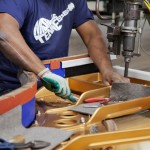 How often? Depends on the piano. Usually after about 50 years on really good pianos. Never on most middle-quality brands.
How often? Depends on the piano. Usually after about 50 years on really good pianos. Never on most middle-quality brands.
What does it do?
There are two elements to rebuilding; belly rebuilding and action rebuilding.
Belly rebuilding involves replacing all of the piano’s old strings, removing and repainting its plate, repairing and refinishing the bridges and soundboard and replacing the pinblock (or wrestplank). This work will restore a piano to its original condition or slightly better.
Action rebuilding involves replacing the worn moving parts, felts and bushings in the action. When done properly, the result is a piano that plays as good or slightly better than when it was new.
Why should I do it? Just like good people, good pianos eventually wear out. Keep in mind that not every piano is a good candidate for rebuilding due to the costs involved. If the piano will not be worth more that the cost of rebuilding when it is completed, it should only be rebuilt for sentimental reasons.
Refinishing
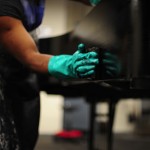 How often? Depends on the piano and the condition of the original finish.
How often? Depends on the piano and the condition of the original finish.
What does it do? Restores the cabinet finish to how it looked when it was new or changes the finish, for example, to a lighter or darker wood. Pianos are constructed with finishes that are unique from other kinds of furniture.
Why should I do it? When rebuilding a piano, the cabinet will usually be refinished at the same time. That way, the finished product looks and performs as good as it can and is worth more when resold.
Refinishing a piano that has not been rebuilt is rarely ever a good investment. If someone has suggested this to you, contact us and we’ll help you out.
Custom finishing – Like repainting a room, custom finishing a piano you already own can update its look. New pianos can also be ordered “raw” and then custom finished to your liking. We are one of a few dealers that Steinway & Sons will sell “raw,” unfinished pianos to for custom finishing.
Piano Restoration (a.k.a. Piano Refurbishing)
How often? It’s impossible to say.
What does it do? We’re not quite sure what this means, but the word gets used a lot by people who seem to know enough about pianos to be dangerous.
Why should I do it? You probably shouldn’t. It seems to mean as little as possible was done to a piano to convince somebody else to buy it.